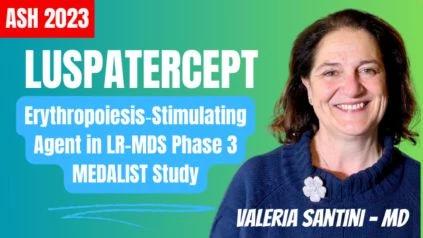By. Valeria Santini, MD
Date: 12/13/2023
At the ASH 2023 symposium, Valeria Santini, MD, a distinguished medical doctor and associate professor of hematology from the University of Florence Medical School in Italy, engaged the audience in a discussion about the Phase 3 Medalist study.
Dr. Santini commenced her presentation by providing a comprehensive overview of the Medalist trial initiated in 2016. This clinical investigation focused on assessing the response to Luspatercept, an active erythroid maturation agent. The study specifically targeted lower-risk myelodysplastic syndromes (MDS) patients with transfusion dependence who were refractory or ineligible for conventional erythropoietic stimulating agents.
The trial involved the administration of Luspatercept at a dosage of one milligram per kilogram every three weeks, comparing it against a placebo at identical intervals. The primary endpoint of the study was the achievement of red blood cell transfusion independence, with evaluations conducted at the 24-week mark. Dr. Santini highlighted the extension phase of the study, allowing responsive patients to continue the double-blind treatment for a more extended follow-up.
Delving into the data, Dr. Santini elucidated the promising long-term efficacy of Luspatercept. The rates of red blood cell transfusion independence lasting 8 and 16 weeks, along with the cumulative duration of response, showcased significant clinical advantages. Notably, patients achieving transfusion independence for over one year constituted a substantial proportion, emphasizing the potential benefits of sustained treatment.
The presentation shifted to an examination of the safety profile of Luspatercept. Dr. Santini addressed the observed decrease in fatigue rates with increasing Luspatercept dosage. She clarified that while fatigue was the most frequently reported adverse event, it was more common at lower doses and diminished with higher doses. Importantly, the fatigue effect was not dose-related, suggesting a nuanced relationship with the drug. Dr. Santini also highlighted that fatigue decreased with continued treatment, indicating a potential adaptation over time.
In conclusion, Dr. Valeria Santini provided valuable insights into the long-term efficacy and safety of Luspatercept at the ASH 2023 symposium. The symposium offered crucial information for the medical community, underscoring the potential clinical benefits for patients with lower-risk myelodysplastic syndromes.

